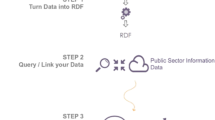
Overview
- Provides practical approaches to addressing common information management issues by the application of leading edge Linked Data research
- Application approaches are based on international standards
- Includes case studies and examples
- Includes supplementary material: sn.pub/extras
Access this book
Tax calculation will be finalised at checkout
Other ways to access
About this book
Enterprise data is growing at a much faster rate than traditional technologies allow. New enterprise architectures combining existing technologies are desperately needed. This book suggests a way forward by applying new techniques of the World Wide Web to enterprise information systems.
Linking Enterprise Data is an edited volume contributed by worldwide leaders in Semantic Web and Linked Data research, standards development and adoption. Linking enterprise data is the application of World Wide Web architecture principles to real-world information management issues faced by commercial, not-for-profit and government enterprises. This book is divided into four sections: Benefits of applying Linked Data principles in enterprise settings, enterprise approval and support of Linked Data projects, specific Linked Data techniques and a number of real-world success stories from early enterprise adopters.
Linking Enterprise Data targets professionals working as CTOs, CIOs, enterprise architects, project managers and application developers in commercial, not-for-profit and government organizations concerned with scalability, flexibility and robustness of information management systems. Computer science graduate students and researchers focusing on enterprise information integration will also benefit.
Similar content being viewed by others
Keywords
Table of contents (13 chapters)
-
Front Matter
-
Why Link Enterprise Data?
-
Front Matter
-
-
Approval and Support of Linked Data Projects
-
Front Matter
-
-
Techniques for Linking Enterprise Data
-
Front Matter
-
-
Success Stories
-
Front Matter
-
-
Back Matter
Reviews
From the reviews:
“An important goal of the book is to propagate notions and techniques related to the semantic Web. … The book suggests and demonstrates the social aspects of linking enterprise data effectively. … This book is for managers and system architects who are interested in building enterprise-wide information services for heterogeneous data on the Web, and who want to enhance Web 2.0 technologies.” (K. Balogh, ACM Computing Reviews, November, 2011)
Editors and Affiliations
Bibliographic Information
Book Title: Linking Enterprise Data
Editors: David Wood
DOI: https://doi.org/10.1007/978-1-4419-7665-9
Publisher: Springer New York, NY
eBook Packages: Computer Science, Computer Science (R0)
Copyright Information: Springer Science+Business Media, LLC 2010
Hardcover ISBN: 978-1-4419-7664-2Published: 25 November 2010
Softcover ISBN: 978-1-4899-8170-7Published: 20 October 2014
eBook ISBN: 978-1-4419-7665-9Published: 10 November 2010
Edition Number: 1
Number of Pages: XXVI, 291
Topics: Computer Communication Networks, Information Systems Applications (incl. Internet), IT in Business, Information Storage and Retrieval, Management of Computing and Information Systems, Information Systems and Communication Service



